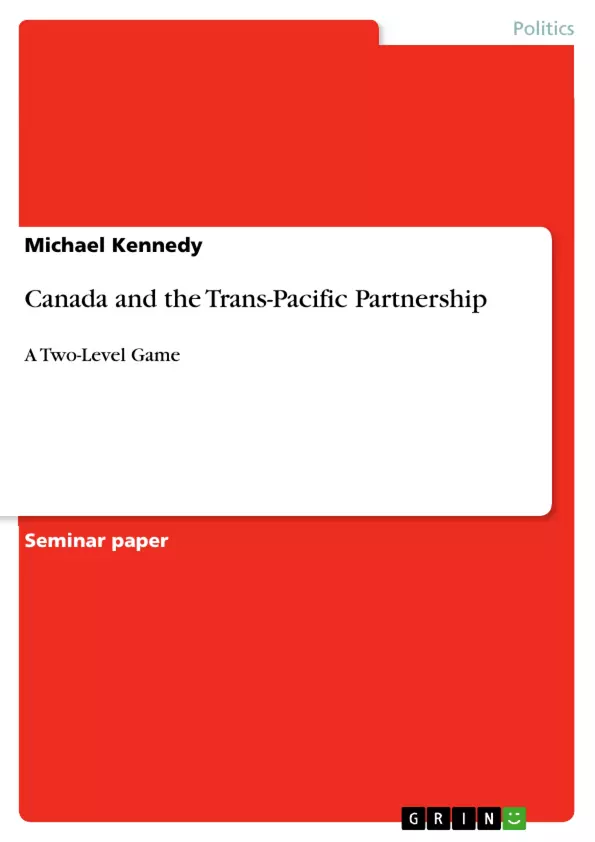The Trans-Pacific Partnership (TPP), formerly titled the Trans-Pacific Strategic Economic Partnership, is a free trade agreement currently being negotiated that could represent the world’s largest multilateral free trade bloc in terms of gross domestic product (GDP). This agreement, if successfully ratified, would establish stronger economic ties between various Pacific Rim countries. Originally signed by Brunei, Chile, New Zealand, and Singapore in 2005, the list of members participating in the TPP negotiations has since grown in size to include Australia, Peru, the United States, and Vietnam in 2008, Malaysia in 2010, and Canada and Mexico in 2012. From 2010, Canada had been an observer of the negotiations but could not participate as it had been blocked by New Zealand and the United States from joining the talks. This was due to its domestic agricultural policies and intellectual property rights standards. In addition to the current negotiating parties, Japan, the Philippines, Taiwan, and South Korea have also expressed interest in joining the discussions. [...]
Inhaltsverzeichnis (Table of Contents)
- INTRODUCTION
- TWO-LEVEL GAME THEORY
- LEVEL CANADA'S LOBBY OF THE UNITED STATES
Zielsetzung und Themenschwerpunkte (Objectives and Key Themes)
This paper examines the influence of domestic politics and international relations on Canada's involvement in the Trans-Pacific Partnership (TPP) negotiations. It analyzes the "two-level game" theory, which highlights the complex interplay between domestic and international pressures on state leaders, and how this theory applies to Canada's decision to join the TPP.
- Canada's strategic interest in expanding its economic presence in Asia-Pacific markets
- The potential impact of TPP on Canada's existing trade agreements, particularly NAFTA
- The role of domestic political interests, including the agricultural supply management system and intellectual property rights, in shaping Canada's TPP strategy
- The influence of international pressure from the United States and other TPP members on Canada's decision to join the negotiations
- The potential for Canada's lobbying efforts to influence the outcomes of the TPP negotiations
Zusammenfassung der Kapitel (Chapter Summaries)
- Introduction: This section introduces the Trans-Pacific Partnership (TPP) and its significance as a potential global free trade bloc. It outlines Canada's interest in joining the TPP, highlighting the economic benefits and challenges associated with this decision. The section also introduces the concept of "two-level game" theory, which will be explored in detail later in the paper.
- Two-Level Game Theory: This chapter explains the "two-level game" theory developed by Robert Putnam, which emphasizes the interconnectedness of domestic politics and international relations. It describes how state leaders must navigate both domestic and international pressures to achieve successful outcomes in international negotiations. The chapter also discusses the concept of "win-set," which refers to the range of agreements that are acceptable to domestic actors within a state. It highlights the potential advantages and disadvantages of a large win-set in international negotiations.
- Level Canada's Lobby of the United States: This section explores Canada's lobbying efforts to secure an invitation to join the TPP negotiations. It discusses Canada's strategic approach to influence the United States and other TPP members, emphasizing the importance of highlighting mutual economic benefits and minimizing potential trade irritants. The chapter also discusses the recommendations made by the C.D. Howe Institute for Canada to effectively lobby the United States, including showcasing Canada's commitment to strong standards aligned with American values.
Schlüsselwörter (Keywords)
This paper focuses on the Trans-Pacific Partnership (TPP), two-level game theory, trade negotiations, domestic politics, international relations, Canada-US relations, agricultural supply management, intellectual property rights, lobbying, win-set, and economic interests.
Frequently Asked Questions
What is the focus of Canada's involvement in the TPP negotiations?
The paper examines how domestic politics, such as agricultural supply management and intellectual property rights, influenced Canada's strategic interest in joining the Trans-Pacific Partnership.
How does "Two-Level Game Theory" apply to the TPP?
The theory explains how Canadian leaders had to balance international pressure (from the US and New Zealand) with domestic interests to reach a ratifiable agreement.
Why was Canada initially blocked from joining TPP negotiations?
New Zealand and the United States blocked Canada primarily due to concerns over its domestic agricultural policies and intellectual property standards.
What is a "win-set" in the context of trade negotiations?
A "win-set" is the range of potential international agreements that would be acceptable to a state's domestic political actors and therefore likely to be ratified.
What role did lobbying play in Canada's TPP strategy?
Canada engaged in extensive lobbying of the United States to highlight mutual economic benefits and align its standards with American values to secure an invitation to the talks.
- Citation du texte
- Michael Kennedy (Auteur), 2012, Canada and the Trans-Pacific Partnership, Munich, GRIN Verlag, https://www.grin.com/document/201516



